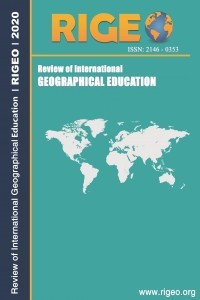Using the ‘New Age Atlantis’ Case Study for Global Education Components of Geography Lessons Across Lower Secondary Schools in Czechia
Using the ‘New Age Atlantis’ Case Study for Global Education Components of Geography Lessons Across Lower Secondary Schools in Czechia
A case study entitled ‘New Age Atlantis or Mysterious Seventh Continent’ was developed as an exemplar model to show how the teaching methods and themes of Global Education (GE) can be used in geography lessons. The main intent of this article is to share an example of good practice about the use of this case study in geography lessons in Czechia. The aim of the study was twofold: to develop an understanding about how plastics contribute to ocean pollution, as a serious and current ecological topic in Global Education; as well as to show how the characteristics and movement of ocean water are related to the topic of ocean pollution. The main research goal was to study how pupils were able to put their skills and knowledge in practice by fulfilling the objective of the teaching activity – to understand global ocean pollution. The teaching activity is based on methods which develop principles of critical thinking, learning by living, brainstorming, discussion, and group teaching. The teaching activity also allows for cross-curricular links to occur between school geography and other subjects including biology, physics, civic education, ecological education, and personal and social education. The teaching activities for the ‘New Age Atlantis’ case study is aimed at pupils aged between 12 to 15 years. The case study results confirm that as pupils collaborate and communicate with their peers and teachers, they learn to critically accept the opinions of others and, at the same time, to defend their own opinions. All of the pupils were able to understand and recognize the problem at hand.
___
- Algalita (2016). Marine Research and Education: Inspiring Solutions to Plastic Pollution. Retrieved from http://www.cee.org/tep-lab-bench/pdf/2016.KA.RT.Talk.pdf
- Anderson, L. F. (1968). An examination of the structure and objectives of international education. Social education, 32(7), 639-47.
- Applis, S. (2014). Global Learning in a Geography Course Using the Mystery Method as an Approach to Complex Issues. Review of International Geographical Education Online (RIGEO), (4)1, 58-70.
- Baker, T. R., Battersby, S., Bednarz, S. W., Bodzin, A. M., Kolvoord, B., Moore, D., Sinton, D., and Uttal, D. (2015). A research agenda for geospatial technologies and learning. Journal of Geography, 114(3), 118-130.
- Belgeon, C., & Crombie, B. (2013). Globální dimenze ve výuce. Příručka pro vzdělávání učitelů. Manchester: Development Education Project.
- Bourn, D. (2008). Education for Sustainable Development and Global Citizenship. Theory and Research in Education, 6(2), 193-206. doi: 10.1177/1477878508091112
- Bullivant, A. (2014). Examples of Good Practice in Development Education from UK. Teachers Agents of Change. Liverpool: Liverpool Hope University.
- Cabezudo, A., Christidis, C., Carvalho de Silva, M., Demetriodou-Saltet, V., Halbartschlager, F., & Mihai, G.-P., (2008). Global education guidelines. A handbook for educators to understand and implement global education. Lisbon: North-South Centre of the Council of Europe. Retrieved from https://rm.coe.int/168070eb85. Accessed 5. Apr 2020.
- Cabezudo, A., Christidis, C., Silva da, M.C., Demetriadou-Saltet, V., Halbartschlager, F. & Mih Department for Education GOV.UK (2005). Developing the global dimension in the school curriculum. Retrieved from https://www.education.gov.uk/publications/eOrderingDownload/1409-2005DOC-EN-02.doc
- Dudková, L., Tillová, K., Halbartschlager, F., Náprstek, M., Pospiechová, R., Vacková, H., . . . Vymětal, J. (2012). Na stopě začleňování globálních témat do výuky. Olomouc: Agentura rozvojové a humanitární pomoci Olomouckého kraje, o.p.s.
- Hicks, D. (2003). Thirty years of global education: a reminder of key principles and precedents. Educational Review, 55(3), 265-275. doi: 10.1080/0013191032000118929
- Karvánková, P., Popjaková, D., Vančura, M., & Mládek, J., (Eds.). (2017). Current Topics in Czech and Central European Geography Education. Heidelberg: Springer.
- Katedra geografie (2019). Zeměpisný badatelský klub. Retrieved from http://www.pf.jcu.cz/structure/departments/kge/zemr-pisn-z-badatelsk-z-klub.html
- Kössl, R., & Chábera, S. (1999). Základy fyzické geografie: přehled hydrogeografie. České Budějovice: Jihočeská univerzita.
- Miléřová, J. (2015). Globální rozvojové vzdělávání. Proč je nezbytné pro českou společnost a udržitelný rozvoj. Praha: FoRS.
- Morgan, A. (2006). Developing geographical wisdom: postformal thinking about, and relating to the world. International Research in Geographical and Environmental Education, 15(4), 336-352.
- MŠMT ČR – Ministry of Education, Youth and Sports of the Czech Republic (2017). Framework educational programme for basic education. Retrieved from http://www.nuv.cz/file/195
- MZV ČR – Ministry of Foreing Affaires of the Czech Republic (2011-15). National strategy for global development education. Retrieved from https://gene.eu/wp-content/uploads/Gene_NationalStrategy-CzechGDE2011EN.pdf
- Nádvorník, O., & Volfová A. (2004). Společný svět. Příručka globálního rozvojového vzdělávání. Praha: Člověk v tísni společnost.
- National Geographic (2012). Sedmý kontinent je z odpadků. Má čtyřikrát větší rozlohu než Německo. Retrieved from: https://www.national-geographic.cz/clanky/sedmy-kontinent-je-z-odpadku-ma-ctyrikrat-vetsi-rozlohu-nez-nemecko-20180712.html?photo=1
- O’Loughlin, E., & Wegimont, L. (2008). Quality in global education: An overview of evaluation policy and practice. Amsterdam: Global Education Network Europe – GENE.
- Pána, L., & Pospíšilová, K. (2012). Globální souvislosti, problémy a výchova. České Budějovice: Vysoká škola evropských a regionálních studií.
- Pike, G. (1997). The Meaning of Global Education: From Proponents' Visions to Practitioners' Perceptions. University of York, Department of Educational Studies. Thesis.
- Pike, G., & Selby, D. (1988). Global teacher, global learner. London Hodder & Stoughton.
- PINcz – People in Need Czechia (2019). Varianty. Global development education. Retrieved from https://www.clovekvtisni.cz/en/global-development-education-5959gp/
- Tarozzi, M., & Inguaggiato, C. (2018). Implementing global citizenship education in EU primary schools: The role of government ministries’. International Journal of Development Education and Global Learning, 10(1), 21-38.
- TED Conferences (2009). Charles Moore: On the Seas of Plastic. Retrieved from: http://www.ted.com/talks/capt_charles_moore_on_the_seas_of_plastic/
- Vaňková-Klímová, Z., & Gajdíková, I. (2013). Humanitární pomoc a rozvojová spolupráce v hodinách zeměpisu. Praha: Charita Česká republika.
- ISSN: 2146-0353
- Başlangıç: 2011
- Yayıncı: Eyüp ARTVİNLİ
Sayıdaki Diğer Makaleler
Petra KARVÁNKOVÁ, Dagmar POPJAKOVÁ, Tatiana MINTÁLOVÁ
Youth Climate Change Mitigation Practices and Adaptation in Malacca State, Malaysia
Nasir NAYAN, Nasir NAYAN, Hashim MOHMADISA, Mahat HANİFAH, Saleh YAZID, Norkhaidi SYAIDATINA BALKHIS
Danilo Jr. ROGAYAN, Lea DOLLETE
Melike FAİZ, Emine KARASU AVCI
